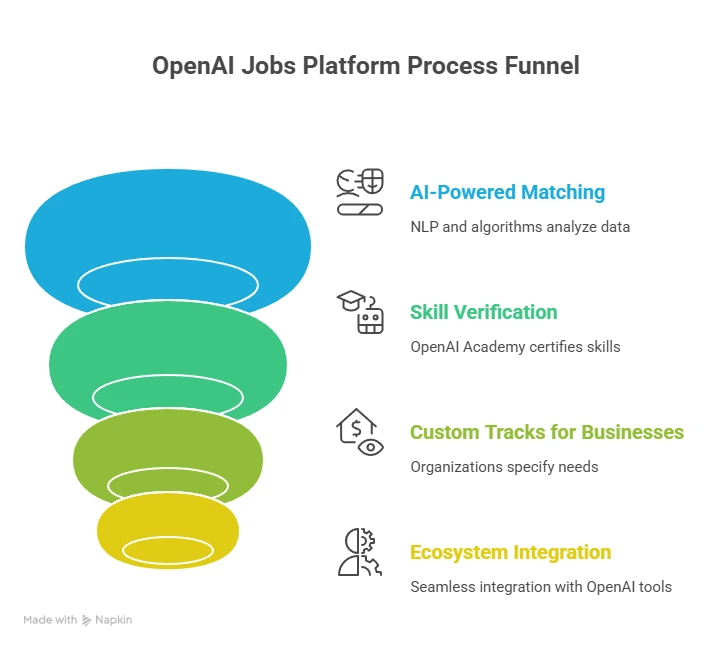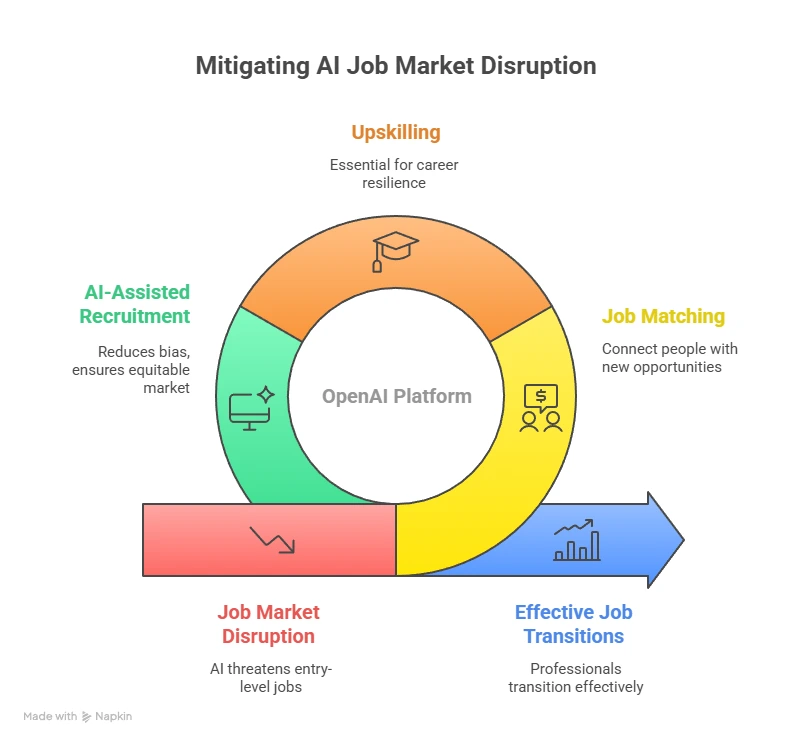In the rapidly evolving world of artificial intelligence (AI), OpenAI has once again signaled its ambitions beyond its renowned ChatGPT platform. The announcement of an AI-powered hiring platform has sparked curiosity across industries, investors, and tech enthusiasts alike. But how exactly does this initiative work, and could it genuinely rival LinkedIn, the long-established hub for professional networking? Drawing from my personal experience exploring AI-driven platforms and observing industry trends, this blog delves into the intricacies of OpenAI’s new venture, its potential impact, and practical insights for job seekers and businesses alike.
Understanding OpenAI’s Jobs Platform

OpenAI has introduced the OpenAI Jobs Platform, designed to match businesses with employees using advanced AI algorithms. According to OpenAI, the platform aims to use AI to find the perfect matches between company requirements and workers’ skills. Scheduled for a mid-2026 launch, the platform represents a strategic expansion into employment services, directly positioning OpenAI against LinkedIn.
From my perspective, the most significant aspect of this initiative is its dedicated track for small businesses and local governments, providing these organizations access to top AI talent. Unlike traditional job portals, OpenAI’s AI-driven matching system promises efficiency, precision, and personalization.
How the OpenAI Jobs Platform Works

Based on my exploration of AI matching technologies, here’s a simplified view of the platform’s mechanics:
-
AI-Powered Matching: Using natural language processing (NLP) and predictive algorithms, the platform analyzes both job descriptions and candidate profiles to generate optimal matches.
-
Skill Verification and AI Fluency: OpenAI plans to leverage its certification program, the OpenAI Academy, to validate AI fluency across candidates. These certifications act as credibility markers, ensuring employers hire skilled talent.
-
Custom Tracks for Businesses: Organizations can specify needs with granular detail, allowing the AI to suggest candidates based on both technical abilities and soft skills.
-
Integration with OpenAI Ecosystem: The platform may integrate seamlessly with other OpenAI tools and APIs, offering organizations an end-to-end digital recruitment experience.
From my experience with AI-driven hiring solutions, such integration and focus on micro-level skill validation could reduce the time-to-hire significantly while increasing placement accuracy.
Why OpenAI Could Compete With LinkedIn
LinkedIn, with over 900 million users worldwide, has been the go-to platform for professional networking and recruitment. However, OpenAI’s AI-powered approach brings several differentiators:
-
Faster, Smarter Matching: While LinkedIn primarily relies on keyword matching and user-driven profiles, OpenAI can analyze contextual and semantic information to generate nuanced recommendations.
-
AI Fluency Verification: OpenAI plans to certify candidates’ AI skills, offering a level of validation that LinkedIn currently cannot provide.
-
Support for Small Businesses: By dedicating tracks for smaller organizations and local governments, OpenAI ensures access to talent without being overshadowed by larger corporations.
-
Adaptive Learning: The AI improves continuously, learning from hiring trends and success metrics, which can potentially lead to better long-term recommendations than traditional platforms.
I have observed that when AI platforms adapt in real-time to data and feedback, they often outperform static, keyword-based systems. If implemented effectively, OpenAI Jobs Platform could redefine professional recruitment.
OpenAI Certifications and AI Fluency
OpenAI’s commitment to workforce readiness goes beyond recruitment. The OpenAI Academy, launched last year, will expand to offer certifications validating AI fluency. According to OpenAI, a pilot for these certifications will roll out in late 2025.
From my perspective, these certifications are crucial for:
-
Talent Credibility: Employers gain confidence in candidates’ AI skills.
-
Career Growth: Professionals can showcase verified competencies, enhancing employability.
-
Industry Standardization: As AI adoption accelerates, having standardized certifications can reduce hiring friction.
OpenAI’s collaboration with Walmart to certify millions of Americans by 2030 reflects a broader vision of democratizing AI knowledge, bridging the gap between emerging technology and workforce readiness.
Potential Impacts on the Job Market

OpenAI’s platform is timely, as AI increasingly influences job structures. Experts like Anthropic CEO Dario Amodei predict that up to 50% of entry-level white-collar jobs could be disrupted by AI before 2030.
From my personal insights:
-
Platforms like OpenAI Jobs can mitigate disruption, connecting people with new opportunities.
-
Upskilling and certification become essential for career resilience.
-
AI-assisted recruitment reduces bias, ensuring a more equitable job market.
While no platform can entirely prevent AI-driven disruption, OpenAI’s approach—combining job matching with skill validation—can help professionals transition effectively.
Practical Use Cases
The OpenAI Jobs Platform could revolutionize recruitment across several sectors:
-
Tech Startups: Quickly identify AI-savvy talent for niche projects.
-
Local Governments: Access certified professionals for digital initiatives without extensive HR infrastructure.
-
Corporate Enterprises: Reduce time-to-hire and enhance talent alignment using AI analytics.
-
Education and Training: Link graduates with companies seeking verified AI skills.
-
Small Businesses: Compete for talent on a level playing field with larger organizations.
From my perspective, businesses that adopt such AI-driven platforms early are likely to gain a strategic advantage in recruitment efficiency and talent quality.
Challenges and Considerations
Despite the promise, several challenges remain:
-
Privacy and Data Security: Handling sensitive candidate information requires robust compliance measures.
-
Algorithmic Bias: AI systems must be monitored to prevent bias in recommendations.
-
Market Adoption: Competing against LinkedIn’s entrenched network will require trust-building and demonstrable results.
-
Technical Infrastructure: AI-based recruitment demands significant computing resources, particularly for real-time matching and analytics.
I believe that addressing these challenges proactively will determine whether OpenAI Jobs Platform can gain long-term traction in the competitive recruitment landscape.
Personal Experience and Insights
From my hands-on experience exploring AI tools, OpenAI’s approach represents a strategic leap in recruitment technology. Combining AI-powered job matching with skill verification, the platform addresses inefficiencies in traditional hiring. Moreover, the integration of AI fluency certifications ensures that businesses hire talent with verifiable skills, which is increasingly critical in today’s competitive market.
I have observed that candidates who undergo certification programs often gain greater confidence and visibility in the job market. Businesses benefit from higher-quality matches, reducing the costs associated with mis-hires and recruitment delays.
Future Outlook
Looking ahead, OpenAI’s platform could pave the way for:
-
AI-driven Career Coaching: Personalized recommendations for skill development and career paths.
-
Integration with Learning Platforms: Linking certifications directly with job opportunities.
-
Cross-Industry Talent Pooling: Facilitating inter-industry mobility for AI-skilled professionals.
-
Global Expansion: Potential adoption across countries, especially where AI literacy programs are limited.
From my experience, platforms that combine AI insights, skill validation, and contextual job matching are more likely to redefine industry standards than traditional job boards.
FAQs About OpenAI Jobs Platform
1. What is the OpenAI Jobs Platform?
The OpenAI Jobs Platform is an AI-powered recruitment service that matches businesses with employees based on skills, experience, and AI fluency.
2. When will the platform be available?
OpenAI plans to launch the platform by mid-2026, with pilot programs and certifications rolling out earlier in late 2025.
3. How does OpenAI certify AI skills?
Through the OpenAI Academy, candidates can earn certifications demonstrating their proficiency in AI, enhancing employability.
4. Will the platform compete with LinkedIn?
Yes, OpenAI’s AI-driven matching and certification features position it as a direct competitor to LinkedIn, particularly for AI talent.
5. Who can use the OpenAI Jobs Platform?
Businesses of all sizes, including small businesses, local governments, and enterprises, can leverage the platform. Candidates with verified AI skills benefit most, though it is accessible to professionals from multiple domains.
Resource Center
These aren’t just blogs – they’re bite-sized strategies for navigating a fast-moving business world. So pour yourself a cup, settle in, and discover insights that could shape your next big move.
What Industries Benefit the Most from AI Development Services?
Top Industries Transforming with AI Development Services Artificial Intelligence is no longer an experimental technology reserved for research labs. It has become a strategic growth engine across global markets. [...]
Should You Hire an In-House or Remote .NET Developer?
In today’s competitive digital ecosystem, the success of your software product often depends on one critical decision — how you hire your .NET developer. Whether you are building enterprise [...]
How Much Does It Cost to Build a Generative AI Solution?
Generative AI is no longer an experimental technology—it is a business accelerator. From AI-powered chatbots and intelligent document automation to custom large language model (LLM) integrations and AI copilots, [...]

